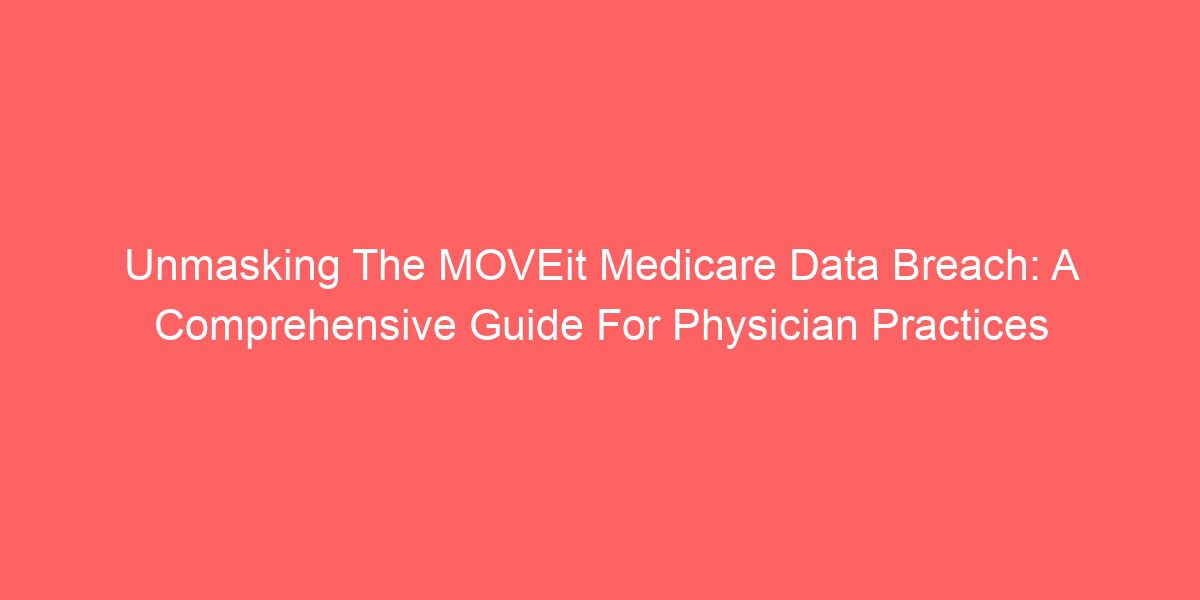Physicians, patients, and healthcare professionals alike were taken aback by the recent alerts from the Centers for Medicare & Medicaid Services (CMS) regarding the MOVEit Maximus data breach. The breach has rocked the healthcare sector, impacting an estimated 612,000 current Medicare beneficiaries. We understand that our readers in physician practice management are grappling with questions and concerns about the breach and potential ramifications.
The Anatomy of the Breach: Detangling the Maximus/MOVEit Data Breach
Before we start discussing the specifics of the breach, it’s crucial to understand Maximus’s role as a Qualified Independent Contractor (QIC). For those unfamiliar, QICs are integral to the Medicare appeal process. Now, the question arises – if a patient’s record wasn’t part of an appeal, could it have still been impacted by the breach?
We wish this were a black-and-white issue, but unfortunately, it’s not. While the prime targets might have been the appeal-related records, other patient data stored in the same databases might have also been put at risk. It highlights how breaches, even with a specific target, can have far-reaching consequences.
Decoding the Data Breach: A Deep-Dive into HIPAA, Ransomware and Healthcare Data
Such instances remind us of HIPAA’s integral role in safeguarding the healthcare ecosystem from data breaches, ransomware, and cyber threats. Without a robust patient data security framework, the sanctity of sensitive medical information could be compromised, leaving healthcare organizations and patients exposed to fraud and identity theft.
FAQ: What Precautions Should Physician Practices Take?
Prevention is always better than cure, especially when it comes to limiting the scope of a data breach. Here are a few precautionary measures that physician practices can utilize:
- Ensure that data is encrypted, both in transit and at rest. HIPAA requires this as a fail-safe.
- Institute mandatory regular updates and patches for all software solutions.
- Limit data access rights to necessary personnel only.
- Train your team to identify and respond appropriately to phishing and social engineering attacks.
- Create a robust response plan for when breaches do occur.
Beyond the Breach: Consequences and Countermeasures
What does the aftermath of this breach mean for healthcare providers, especially physicians and their patients? It has highlighted the need to bolster security systems and protocols across healthcare service providers. Engaging with reputable health data security and breach management experts could delineate a critical path forward to avoid incidents of this nature.
FAQ: Where Can Physician Practices Seek Guidance?
Medical practices are not left alone to navigate the murky waters of data security. There are several resources, both governmental and private, offering assistance in the aftermath of a breach. Organizations such as the Health Care Industry Cybersecurity Task Force and the U.S. Department of Health & Human Services offer toolkits, best practices, and resources to help providers strengthen their cybersecurity measures.
Is Your Data Secure?
In conclusion, the Maximus/MOVEit data breach serves as a stark reminder of the potential vulnerability of healthcare data security. By understanding the nature of the breach, and potential preventive steps, stakeholders can proactively guard against future breaches and maintain the trust of Medicare beneficiaries. How robust are your practice’s data security measures? Are you prepared for a breach, if it were to happen?

